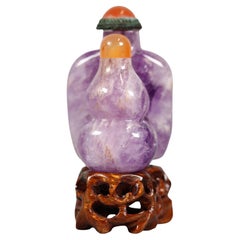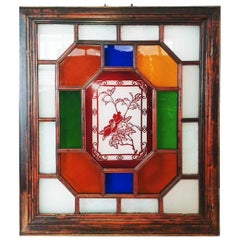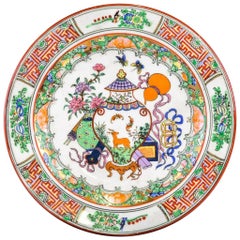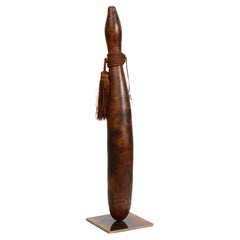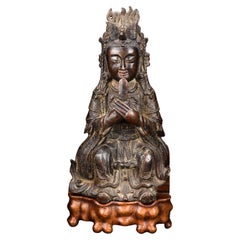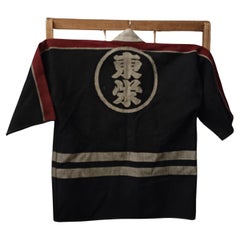East Asian Antiquities
to
335
565
288
1,316
13
5
4
3
2
2
1
1
1
1
480
410
426
18
212
46
61
23
3
9
3
3
4
7
6
15
2
562
294
284
248
157
1,881
1,334
741
388
380
1,334
1,331
1,331
10
3
3
2
1
Place of Origin: East Asian
Chinese amethyst 'double' snuff bottle, 19th c.
Located in New York, NY
on carved fitted wooden base; agate stoppers; measurements provided are the overall measurements including the wooden base and stopper
Category
Late 19th Century Antique East Asian Antiquities
Materials
Amethyst
Late 19th Century Manchurian Stained Glass Panel, Suzchou, China
Located in New York, NY
A Manchurian stained-glass panel on a wood frame, Late 19th century. Floral motif in the center, plus etching on clear panels. Excellent antique condition. Slight wear commensurate w...
Category
Late 19th Century Antique East Asian Antiquities
Materials
Glass, Wood
$856 Sale Price
45% Off
Vintage Chinese Porcelain Plate, Made in China, Early 20th Century
Located in Roma, IT
This porcelain plate is an original decorative object realized in China by Chinese manufacture, at the beginning of the 20th century.
It is decorated with geometric and floral or...
Category
Early 20th Century East Asian Antiquities
Materials
Ceramic
Japanese Antique Samurai Wine / Sake Gourd “Hyotan” Lacquered Calabash Flask
Located in Sampantawong, TH
Antique Samurai drinking vessel with red lacquer and wooden stopper in excellent condition. The hand made cord tassels complete the set.
Dark old patina due to its age enhances its ...
Category
Early 20th Century East Asian Antiquities
Materials
Fruitwood
$680 Sale Price
20% Off
Bixia Yuanjun Figure of Bronze Dated Ming Dynasty, 1368-1644
Located in London, GB
Bixia Yuanjun figure of bronze dated Ming Dynasty 1368-1644.
Base of hardwood.
Height excluding base 26cm;
Heigh including base 31cm.
Condition:
Corrosion on reverse/back;
...
Category
15th Century and Earlier Ming Antique East Asian Antiquities
Materials
Bronze
Japanese Antique Sashiko Banten FireFighter Jacket Toei black 1970s
Located in Paris, FR
This Sashiko b(h)anten was made around 1970 in Showa era in Japan.
On the front, it is written ''Toei town fire department / 5th division 2nd unit vice leader" in Japanese. On the ...
Category
Late 20th Century Showa East Asian Antiquities
Materials
Cotton
Japanese Bronze Ikebana Lotus Footed Bowl
Located in Delft, NL
Japanese bronze Ikebana Lotus footed bowl
A Japanese Meiji Period (1868-1912) footed bowl in the shape of a leaf with Lotus flowers raided o...
Category
Late 19th Century Antique East Asian Antiquities
Materials
Bronze
Japanese Vintage Hanten Cotton Jacket 'Asai' 1940s
Located in Paris, FR
Hanten is a type of traditional Japanese garment that is often referred to as a "short coat" or "jacket". `it has a loose, kimono-like design with a straight collar and is typically ...
Category
Mid-20th Century Showa East Asian Antiquities
Materials
Cotton
Japanese Cotton Hanten, 1930s
Located in Paris, FR
This is a jacket with cotton which was made in Japan.
These kind of jackets are called Hanten in Japanese.
Hanten is a short jacket similar to a haori, but without a gusset. It is...
Category
1930s Showa Vintage East Asian Antiquities
Materials
Cotton
Japanese navy blue yukata with dotted pattern
Located in Paris, FR
This is a cotton jacket which was made in Japan in Showa era around 1990s.
A yukata (浴衣, lit. 'bathrobe') is an unlined cotton summer kimono, worn in casual settings such as summer ...
Category
Late 20th Century Showa East Asian Antiquities
Materials
Cotton
19th Century Chinese Ginger Jars
Located in Esbeek, NL
Beautiful set of Chinese ginger jars
18th century or earlier.
Category
18th Century Antique East Asian Antiquities
Materials
Porcelain
$7,135 / set
Antique Japanese Azuki colour Deer Silk Half Belt 'Hanhaba obi' 1960s
Located in Paris, FR
This is a Japanese beautiful Kimono belt called 'Han haba obi'.
One side is with motifs and other side has no motif. It is a belt for kimono but you can use as a table runner or wal...
Category
1960s Showa Vintage East Asian Antiquities
Materials
Silk
$266 Sale Price
20% Off
Northern Wei Dynasty, Antique Chinese Painted Pottery Standing Court Lady
Located in Sampantawong, TH
Antique Chinese painted pottery standing court lady, with original pigments remaining.
Age: China, Northern Wei Dynasty, A.D. 386 - 535
Size: Height 19.5 C.M. / Width 4 C.M. / Depth...
Category
15th Century and Earlier Antique East Asian Antiquities
Materials
Pottery
Japanese Antique Shirushi-Hanten Jacket Cotton 'Oohata Chaten' 1900s
Located in Paris, FR
This is a jacket with cotton which was made in Japan.
These kind of jackets are called Hanten in Japanese.
Hanten is a short jacket similar to a haori, but without a gusset. It is w...
Category
Early 20th Century East Asian Antiquities
Materials
Cotton
Chinese Export Silver Dragon Bowls, Set of 3
Located in Stamford, CT
Set of three Chinese export silver bowls.
Tripod bowl has stylized bamboo legs and center medallion (no monogram). Featuring two repoussè dragons. T...
Category
1860s Chinese Export Antique East Asian Antiquities
Materials
Sterling Silver
$1,750 / set
Chinese cassette with brass fittings and parchment cover, China 18th century
Located in Walkertshofen, BY
Unusual Chinese cassette with brass fittings and a red painted parchment cover. Stylized floral decoration on all sides, partly with gold hatched frame borders. Characteristic brass ...
Category
18th Century Antique East Asian Antiquities
Materials
Brass
Large Vintage Chinese Hand Embroidery Tapestry
Located in Delray Beach, FL
About
A spectacular Chinese embroidery wall hanging purchased from Antique Chinese collector This example, entailed with many stitch techni...
Category
1960s Vintage East Asian Antiquities
Materials
Wool, Cotton, Silk
China Ancient Stone Entertainer, Han Dynasty 200 AD
Located in South Burlington, VT
China an ancient limestone figure of an Entertainer replete with hands holding tambourines and a top a drum, -for the afterlife- , Han dynasty 206 BC...
Category
15th Century and Earlier Han Antique East Asian Antiquities
Materials
Limestone
$12,000 Sale Price
20% Off
Japanese Silk Red Black Haori Jacket Dot Pattern 1960s Showa
Located in Paris, FR
This is a silk jacket which was made in Japan.
It was made in Showa era around 1960s.
The haori is a traditional Japanese hip- or thigh-length jacket worn over a kimono. Resembling ...
Category
Late 20th Century Showa East Asian Antiquities
Materials
Silk
20th Century Tibetan Leather, Brass Ghau Prayer Bag
Located in Pomona, CA
Ghau is a small prayer box/bag worn as pendant by Buddhists as portable shrines which can be pray by prayer during their travel. This Ghau prayer bag (travel Buddha...
Category
Mid-20th Century Chinese Export East Asian Antiquities
Materials
Brass
$288 Sale Price
25% Off
Decorative Embossed Chinese Pillow Chest / Box with Leather Cover
Located in Kastrup, DK
An antique Qing Dynasty pillow chest made of wood and covered with leather.
The front and sides are adorned with embossed decorations, showcasing tradit...
Category
Early 20th Century Qing East Asian Antiquities
Materials
Metal
Chinese Coconut Cup
Located in New Orleans, LA
Carved from the shell of a coconut, this enchanting Chinese cup exhibits exceptional artistry. An elegant floral design encircles the entire cup, while the interior is fully lined with silver. In addition to the poison detecting powers attributed to coconuts, the Chinese believed that silver would tarnish when in contact with poison. In fact, many wealthy Chinese used silver lined cups and chopsticks tipped with silver fittings as an assurance against poisoning. To find a silver-lined coconut cup...
Category
Early 19th Century Other Antique East Asian Antiquities
Materials
Coconut
$3,950
18th/19thC Nepalese Bronze or Brass Fierce Deity - 8630
Located in Ukiah, CA
18th/19thC Nepalese bronze or brass fierce deity. I've not seen one like this before. Ten inches tall. Filled with Tantric energy. Real charisma-when ther...
Category
18th Century Antique East Asian Antiquities
Materials
Bronze
19th C., Meiji, a Pair of Antique Japanese Porcelain Blue and White Charger Dish
Located in Sampantawong, TH
A pair of Japanese porcelain blue and white charger dishes.
Age: Japan, Meiji Period, 19th century
Size: Diameter 46.8 C.M. / Thickness 6 C.M....
Category
19th Century Antique East Asian Antiquities
Materials
Porcelain
$1,760 Sale Price / set
20% Off
19th Century, Meiji, Antique Japanese Ceramic Jar
Located in Sampantawong, TH
Antique Japanese ceramic jar.
Age: Japan, Meiji Period, 19th century
Size: Height 34 C.M. / Width 46.2 C.M.
Condition: Nice condition overall.
100% satisfaction and authenticity guaranteed...
Category
19th Century Antique East Asian Antiquities
Materials
Ceramic
Japanese Ikat Peasant Cotton Kasuri Jacket with Belts 1970s
Located in Paris, FR
This is a jacket made in Japan called kasuri. This kasuri jacket was made around 1970s.
It was used to wear by some peasants to work. This is made with cotton Ikat.
Dimensions:
Heig...
Category
Late 20th Century Showa East Asian Antiquities
Materials
Cotton
Japanese silk jacket HAORI black
Located in Paris, FR
This is a silk jacket which was made in Japan.
It was made in Showa era around 1970s.
The haori is a traditional Japanese hip- or thigh-length jacket worn over a kimono. Resembling ...
Category
Late 20th Century Showa East Asian Antiquities
Materials
Silk
Northern Wei Dynasty, Antique Chinese Painted Pottery Standing Court Lady
Located in Sampantawong, TH
Antique Chinese painted pottery standing court lady, with original pigments remaining.
Age: China, Northern Wei Dynasty, A.D. 386 - 535
Size: Height 22.2 C.M. / Width 5.2 C.M. / Dep...
Category
15th Century and Earlier Antique East Asian Antiquities
Materials
Pottery
Japanese Antique Bronz Gilt Vase with Flower and Bird Design, Meiji Period
Located in Chuo-ku, Tokyo
This work is produced by Egawa, a master craftsman from the Meiji era.
It can be said to be a representative of brilliant metalworking technology.
"Kaga zougan", an excellent met...
Category
Late 19th Century Antique East Asian Antiquities
Materials
Bronze
18th Century Chinese Miniature Porcelain Blue and White Kangxi Vase
Located in Delft, NL
18th Century Chinese Miniature Porcelain Blue and White Kangxi Vase
Chinese miniature porcelain Blue and White Kangxi vase Kangxi, (1662-1...
Category
Early 18th Century Antique East Asian Antiquities
Materials
Porcelain
Antique Tibetan Buddhist Handcrafted handheld Spinning Prayer wheel
Located in Pomona, CA
This is handcrafted Tibetan handheld spinning Prayer Wheel. This spinning prayer wheel was made from Sky Iron and has detailed handcrafted Tibetan traditional design with Copper wire...
Category
Early 20th Century Chinese Export East Asian Antiquities
Materials
Metal
$446 Sale Price
25% Off
Chinese rose medallion porcelain plate, 19th c.
Located in New York, NY
figural, and bird & flower motifs
Category
Late 19th Century Antique East Asian Antiquities
Materials
Porcelain
Chinese Blue and White Porcelain Salt Cellars, Kangxi
Located in Delft, NL
Chinese porcelain salt cellars, Kangxi (1662-1722)
2 Chinese porcelain salt cellars with 3 rims and inside the double blue ring a scene of sever...
Category
Late 17th Century Antique East Asian Antiquities
Materials
Porcelain
Japanese Antique Silk Kimono Belt, 1960s
Located in Paris, FR
This is a Fukuro Obi made in Japan around 1960s.
It is made with Silk and it is in good condition.
Obi is a belt of varying size and shape worn with both traditional Japanese clothing like Kimono.Obi are categorised by their design, formality, material, and use, and can be made of a number of types of fabric, with heavy brocade weaves worn for formal occasions, and some lightweight silk obi worn for informal occasions.
Fukuro obi are slightly less formal than maru obi...
Category
Late 20th Century Showa East Asian Antiquities
Materials
Silk
$361 Sale Price
20% Off
Chinese Han Dynasty Green Glazed Covered Storage Jar
Located in Austin, TX
A wonderful Han Dyansty (206 BC-200 AD) storage vessel. The circular body set upon three legs and fitted with a lid. The entirety covered in heavy leaded green glaze, imitating bronz...
Category
15th Century and Earlier Han Antique East Asian Antiquities
Materials
Pottery
Archaic Jade Knife
Located in Greenwich, CT
Archaic Jade knife with relief carving of beast. Probably 20th Century.
Category
20th Century East Asian Antiquities
Materials
Jade
$1,500
Japanese Cotton Kimono IKAT Kasuri 1970s Showa
Located in Paris, FR
This is a kimono made in Japan called kasuri. This kasuri kimono was made around 1970s.
It was used to wear by some peasants to work. This is made with cotton Ikat.
Dimensions:
Heig...
Category
1970s Showa Vintage East Asian Antiquities
Materials
Cotton
$271 Sale Price
40% Off
Rare Chinese Ningxia Saddle Cover Rug, produced for Tibetan around 1850/70
Located in Vienna, AT
A rare Ningxia saddle cover with pure natural colors, as well as with the original undyed beige yack wool. The two saddle holes still with the original red leather edging. Like all antique covers, made in two parts. Possibly an export product for Tibet. These covers were always used as a saddle pad...
Category
Mid-19th Century Chinese Export Antique East Asian Antiquities
Materials
Wool
19th Century Chinese Wooden Rectangular 'Mythical Beasts' Box
Located in Brea, CA
19th Century Chinese wooden rectangular 'Mythical Beasts' Box , it is maybe Zitan wood box, The hinged cover carved with a dragon, a phoenix, a qilin, a tortoise a fish and other creatures among stylised smoke, the sides with birds lurking amidst shrubs emerging from rockery, the borders carved with key fret...
Category
19th Century Qing Antique East Asian Antiquities
Materials
Wood
Crackle Glazed Bowl, Qing Period
Located in seoul, KR
Rounded form, covered with a glaze of a pale grey and yellowish tone with brown network of crackles.
Period: Qing Dynasty or Song Dynasty
Type: Bowl
Medium: Crackle Glazed
Size : 9...
Category
18th Century Qing Antique East Asian Antiquities
Materials
Ceramic
$875 Sale Price
30% Off
Chinese Neolithic Qijia Culture Red Pottery Vessel, 2200 BC - 1600 BC, China
Located in Austin, TX
A sublime Chinese neolithic burnished red pottery jug, Qijia Culture (2200 BC - 1600 BC), modern day Gansu Province, China.
The simple jug of alluring form, with a voluptuous body, short, narrow neck with slightly everted mouth, and a single ear handle.
The red pottery of gorgeous shades of terracotta, and slightly burnished.
Overall surprisingly contemporary for a piece over three thousand years old.
The Qijia Culture was a late Neolithic...
Category
15th Century and Earlier Antique East Asian Antiquities
Materials
Pottery
STUNNiNG EARLY 20TH CENTURY HAND CARVED SOAPSTONE DOUBLE VASE
Located in West Sussex, Pulborough
We are delighted to offer for sale this lovely early 20th century Chinese hand carved flowers soapstone double vase.
This is a good example of a Chinese hand carved vase...
Category
Early 20th Century Chinese Export East Asian Antiquities
Materials
Soapstone
Chinese Export Silver Mirror
Located in New Orleans, LA
This exquisite Chinese export silver mirror is a work of exotic beauty. Elegantly shaped and monumental in size, this looking glass is held within ...
Category
Early 20th Century Chinese Export East Asian Antiquities
Materials
Silver
$24,500
Chinese Sea Foam Green Peking Glass Spherical Vase, Early 19th Century
Located in New York, NY
provenance: E&J Frankel Collection
Category
Early 19th Century Antique East Asian Antiquities
Materials
Glass
Chinese porcelain sitting dog, Dehua, Qing Dynasty, Kangxi Era
Located in Delft, NL
Chinese porcelain sitting dog, Dehua, Qing Dynasty, Kangxi Era
Small Chinese porcelain dog, China, 18th century
Dehua, Qing dynasty (1644-1911...
Category
Early 18th Century Antique East Asian Antiquities
Materials
Porcelain
Silk Black Haori Jacket for Men 1960s Sesshu Toyo
Located in Paris, FR
This is a Japanese Haori jacket for men made in 1960s (Showa era) and made with silk.
It is reversible. Inside of this haori, the design is with landsca...
Category
1960s Showa Vintage East Asian Antiquities
Materials
Silk
$361 Sale Price
20% Off
Japanese Meiji Mixed Metals Plate with Birds and Foliage
Located in Louisville, KY
This stunning work of Japanese metal work is brilliant in detail and craftsmanship. Made of copper, bronze and perhaps other metals, the imagery cr...
Category
Late 19th Century Meiji Antique East Asian Antiquities
Materials
Metal, Bronze, Copper
Longquan Celadon Five-Spouted Jar, Northern Song Dynasty (AD 960~1127)
Located in seoul, KR
Thickly potted with an ovoid body of five horizontal lobes tapering toward the top, carries both aesthetic and practical values. The jar is intricately carved with rows of upright lo...
Category
15th Century and Earlier Antique East Asian Antiquities
Materials
Celadon
$1,885 Sale Price
35% Off
Han Dynasty, a Pair of Antique Chinese Green Glazed Pottery Jars
Located in Sampantawong, TH
A pair of Chinese green glazed pottery jars.
Lead glaze with copper is the main colorant used in Han period to produce green glaze. Greenware became popular during the Eastern Han...
Category
15th Century and Earlier Antique East Asian Antiquities
Materials
Pottery
$2,280 Sale Price / set
20% Off
Shaanxi History Museum Shaanxi History Museum, by Feng Gengwu, 1st Ed
Located in valatie, NY
Shaanxi History Museum Shaanxi History Museum, by Feng Gengwu. Published by Shaanxi Tourism Publishing House, 2005. 1st Ed hardcover with dust jacket. Shaanxi History Museum, which i...
Category
21st Century and Contemporary East Asian Antiquities
Materials
Paper
Tang Dynasty, Antique Chinese Painted Pottery Horse and Rider with Oxford TLTest
Located in Sampantawong, TH
Antique Chinese painted pottery horse and rider with original pigments remaining.
Thermoluminescence (TL) test result from Oxford Authentication Ltd.
is included.
Age: China, Tang D...
Category
15th Century and Earlier Antique East Asian Antiquities
Materials
Pottery
Japanese Silk Kimono for Men 1990s Showa Retro
Located in Paris, FR
This is a men's silk Kimono.
Kimono is a traditional Japanese garment. It is usually made of silk or sometimes cotton and wool. There are different kinds of "kimonos" but they all ...
Category
1990s Showa East Asian Antiquities
Materials
Silk
15thC or Earlier Chinese Guardian Figure - 9459
Located in Ukiah, CA
Early Chinese guardian figure. Hard to date because it is so unique, but based on the casting and overall look it appears to be at least 15thC or and ...
Category
15th Century and Earlier Antique East Asian Antiquities
Materials
Bronze
Early 20th Century, Showa, Japanese Bronze Mirror with Stand
Located in Sampantawong, TH
Japanese bronze mirror with stand.
Age: Japan, Showa Period, Early 20th Century
Size: Diameter 15 C.M. / Height 24.5 C.M.
Size including stand: Heig...
Category
Early 20th Century East Asian Antiquities
Materials
Bronze
$440 Sale Price
20% Off
Japanese Silk Haori Jacket Simple Black 1980s MaruniChigaiTakanoHaMon
Located in Paris, FR
This is a silk jacket which was made in Japan.
It was made in Showa era around 1980s.
This haori jacket has a family crest of MaruniChigaiTakanoHaMon.
The haori is a traditional Ja...
Category
1980s Showa Vintage East Asian Antiquities
Materials
Silk
Japanese Silk Gray Haori Jacket Shibori Technique 1970s Showa
Located in Paris, FR
This is a silk jacket which was made in Japan. This kind of jacket is called 'Haori' in Japanese.
It was made in Showa era around 1970s. This jacket is made with Shibori technique.
...
Category
Late 20th Century Showa East Asian Antiquities
Materials
Silk
19th Century Red Lacquer Folding Chair China Round Back Chair
Located in Epfach, DE
The Chinese folding chair was made in the beginning of the 19th century. It is worked out very beautiful and the red lacquer is in a good conditi...
Category
Early 19th Century Antique East Asian Antiquities
Materials
Leather, Wood
European Chinese Export "Canton enamel" Oval Box, 18th Century
Located in Delft, NL
An European Chinese export "Canton enamel" oval box, 18th century
Qianlong, (1736-1795)
An enamel box with floral decor made for the export for Euro...
Category
18th Century Antique East Asian Antiquities
Materials
Copper
Chinese Blue and White Porcelain Pots
Located in Queens, NY
2 Asian Chinese-style (20th Century) blue and white porcelain jardinieres with scenes (PRICED EACH)
Category
20th Century Chinese Export East Asian Antiquities
Materials
Porcelain
$2,500 / item
Japanese Antique flower stand, Wabi-Sabi, Japandi
Located in Katori-Shi, 12
A chic flower stand that stands quietly.
Its calm presence adds elegance to any space.
The table top is made of Tochigi veneer, with a unique luster that subtly emerges from the dee...
Category
Early 20th Century Taisho East Asian Antiquities
Materials
Wood
Recently Viewed
View AllMore Ways To Browse
Large Chinese Celadon Pots
Khmer Torso
Ancient Luristan Bronze
Chinese Terracotta Army Warriors
Cloisonne Pots Bonsai Trees
Greco Bactrian
Han Dynasty Amphora
Han Dynasty Court Lady
Palanquin Handles
Sancai Phoenix
Schist Gandharan Buddha
Bactrian Stone
Chinese Coconut Cup
Han Dynasty Chinese Cocoon Jar
Han Dynasty Cocoon Jars
Han Dynasty Pig
Khmer Goddess
Kojima Shoten
